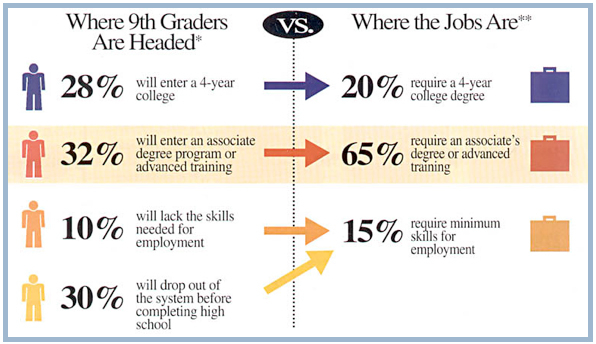How do you replace retiring maintenance people when you can’t find qualified candidates?
By Bill Wilder, M.Ed., of Life Cycle Engineering
As appeared on www.reliableplant.com
Most organizations today are confronted with a retiring maintenance workforce and a shortage of qualified replacements. The research proving this is legion and widely publicized. Several factors contribute to the lack of available qualified people. This is partly due to the gap between the education people are seeking and the needs of the workplace.
By 2010, 40% of all new jobs will require at least a two-year associate’s degree in one of the technical areas increasingly found in the advance manufacturing sector.
- National Council for Advanced Manufacturing
Nearly 60% of “new” jobs in the early 21st century will require skills held by just 20% of the present workforce.
- National Commission on Math & Science Teaching
More than half of the nation’s youth leave high school without the entry-level foundation and work-readiness skills needed to find and hold a job.
- National Council for Advanced Manufacturing

Source: Robbie Barnett, AVP Education Policy – SC Chamber of Commerce and D’Amico, C. Workforce 2020
If you can’t hire people with the knowledge and skills you need then you will have to train them. The selection criteria should be “can they learn” and “do they fit”. Hire people for their talents, character and values – people who share the beliefs and values of your organizational culture and have a talent or passion for learning. Learning agility – the ability to learn, unlearn, and relearn is a critical survival skill for individuals and organizations. As Living Company author Arie de Geus points out “The ability to learn faster than your competitors may be the only sustainable competitive advantage.”
Once hired the challenge becomes teaching them the skills and knowledge your business needs. This means more than simply taking a class. Learning that changes behavior to produce results is a process – not a single event.
Bill Wilder, M.Ed is the founder and director of the Life Cycle Institute, the learning, leadership and change management practice at Life Cycle Engineering. The Institute integrates the science of learning and the science of change management to help organizations produce results through behavior change. You can reach Bill at bwilder@LCE.com.
© Life Cycle Engineering, Inc.

For More Information
843.744.7110 | info@LCE.com
